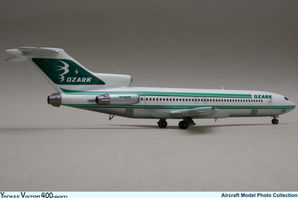Here we have two 767-323ERs produced by two well-known brands that don't cease to amaze. One of them because their recent release sets have been consistently full of newer versions of highly popular subjects, and the other one because of how well their twenty-something-year-old models stand up to today's product.

Contestant Number 1:
Aircraft: American Airlines Boeing 767-323ER
Reg.: N377AN
Brand: Phoenix Models
Release Date: Summer 2023
The Phoenix 767-300 mold is highly praised as it is the only one that features slot-in wings out of the ones in use today. It is also a pretty good mold overall, as most 767-300s in 1:400 scale are.
American is a popular airline and many collectors are after their "chrome" livery that was popular during the 1980s-2010s. GeminiJets had released an American 767-300 in this livery using this same Phoenix mold back in 2010 (pre-antenna era in 1:400) which has become rare and sought after (as you can see here). That model came with winglets though, but do not worry, Phoenix didn't stop with the model featured in this article, they went full on and also released one with winglets and another one in the One World c/s; all of them with current level of detail and antennas. The non-winglet version that I purchased looks excellent.


And below a photo of the real aircraft represented by the model as it looked in the early 2000s, with the "Luxury Liner" titles on the nose area:
The titles on the model appear to be not bold enough. Otherwise, looks very nice.
Contestant Number 2:
Aircraft: American Airlines Boeing 767-323ER
Reg.: N351AA
Brand: Dragon Wings
Release Date: 2000
Dragon Wings produced no shortage of American Airlines models, but during the majority of my time as a collector, it was GeminiJets who had a monopoly in that market. GeminiJets works hard to protect the value of its collectibles while focusing on corporate deals with airlines and other aviation companies. That translates into plenty of current subjects released by them, while the output of classic subjects is a trickle at best. Needless to say, before NG and the rebellion of Phoenix, AA contemporary classics, including DW releases, appreciated well on the secondhand market. Still, DWs were the cheaper option, so I have plenty of their AA releases in my collection.
As was the case with the majority of diecast models during those years, it was difficult to scale the landing gears properly. This in turn gave the wide-bodies, such as the 767, an upper arm. For a 24-year-old model, it looks remarkably well:


And the real aircraft:
Despite the model being painted (though a chrome metallic version exists) and lacking a lot of detail, DW seems to have done a better job with the boldness of the fuselage titles. Also, the DW wing-to-fuselage joint looks better.
Together:

In the picture above it is evident that the DW version has too much of a nose-up attitude (though If I'm being picky I'd say the Phoenix sits a tad too flat). This is probably just a byproduct of having chunky removable landing gear. DW also printed the cockpit windows a tad low - this is something that I have seen both manufacturers do from time to time. But look at how fine the edges of the windshield are on the DW example!


Phoenix's got the overwing window exit pathway markings spot on. Also, as far as I can tell, Phoenix did an outstanding job with the placement of sensors, intakes, panels, and similar details all around, including the belly. The DW version is extremely crude in terms of details. But remember, the DW model was released 24 years ago when 1:400 scale was less than half a decade old; something that in itself can add value to the model.
Wrapping Up
Once again, I applaud Phoenix for their release choices; no-brainers if you ask me. American Airlines is very popular, particularly around my neck of the woods, and that chrome livery has joined the ranks of the most iconic paint schemes of contemporary commercial aviation. In this case, the Phoenix model is not replacing the old DW one in my collection, but it rather has become its wingman.















Comments